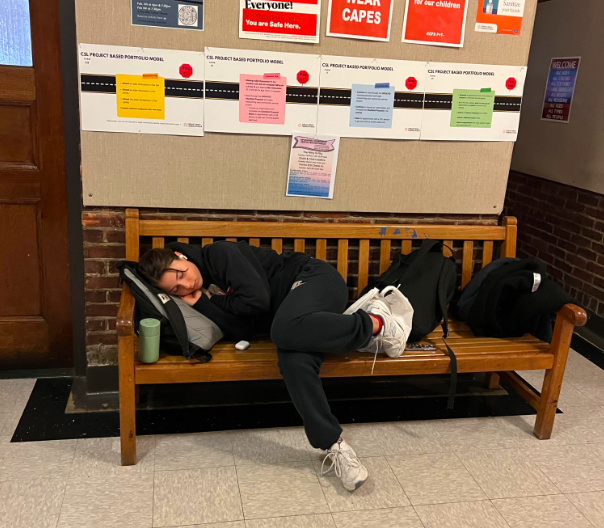Pictured Above: Form VI Student and Co-President of The Upper School, Tess McGarvey
Senioritis. Is it really a thing? The likely answer any student in the Fieldston community would give until the first day of their senior year is: no. Senioritis sounds like some kind of springtime flu that comes and goes very quickly. I tried to pin down a senior to get some specifics, but I barely got an answer. “It’s a culture. It’s a movement. It’s just a culture. It’s a movement towards something else after a very long four years,” said Miles Segal (VI) just before he disappeared around the corner, like he had told me more than he wanted to. In my mind, I felt like he hadn’t said anything. Was I just talking to someone or was that a ghost? Nope. It was actually a senior. Truth is, senior year of high school is not anything like the other three years simply because it’s the last one. Seniors are the only students in the school who won’t ever be in high school again and that unique position is how this phenomenon sets in.
Senior year begins innocently enough. There is just a general feeling of excitement in the air like some big changes are on the horizon and, while not yet defined, will likely mean more fun and a new environment. “Senioritis is almost like when your relationship transitions from the romantic to the friend zone but you’re still excited to see the person,” Patrick Kisling (IV) said, “Colleges have been applied to but maybe the acceptance letters haven’t come…” And that’s just it. Seniors are comfortable at Fieldston but don’t know what’s next. It’s a weird limbo in the beginning months of the school year and that generally explains the nervous excitement that characterizes the Fall months.
Phase two of senioritis takes the wheel of the car unexpectedly and can be hard to deal with. Phase two is definitely apathy mixed with a splash of angst-filled doubt about the future. “I think it’s like you feel ready to leave where you are and move on to the next adventure but you don’t yet know where that is,” said an anonymous senior with an uncertain look. It begs the question whether seniors want to leave, and therefore start to disengage; or whether uncertainty makes seniors enlist apathy to shield themselves from feelings of disappointment. It’s possible that senioritis is not a lack of desire after all but actually a healthy defense against overwhelming feelings of anticipation about the next life phase.
Phase three sets in after choices have been made for the next year. There is another big change and growth that comes with decision making. Whether it’s off to college in Europe or taking a gap year to backpack in The Andes or starting at a completely different college than the one you imagined, the certainty of next steps gives most seniors a strange burst of motivation. It’s almost like cramming for the test in the cafeteria 15 minutes before. It’s now or never. Seniors tend to display an uncharacteristic surge of energy, a sense that activities and projects need to get completed once and for all. While phase three is relatively energetic, it’s also fraught with doubt. “We spend so much of our four years trying to get out of here but what do we do with all our feelings when our wish is finally granted?” said Kisling. Good question.
The final phase of senioritis is unexpected euphoria mixed with unpredictable moments of sentimentality. You may witness seniors laughing with friends in the hallway one minute and then tearing up in their last French class the next. While no one misses the 20 page history papers or the unexpected math quizzes, people can miss their friends, the natural beauty of the environment and the sense of community. There is a comforting bubble in high school that is almost indescribable. You can’t wait to go but don’t want to leave it behind. After all, kids do a lot of growing and soul searching and now it’s time to go out in the world and make something of yourself!
“The problem is that the kids are literally spent and I don’t blame them for feeling that way,” said Form VI Dean John Reyes. Teachers see the end of a period of hard academic work. Students see it as a demanding moment of transition. It might be time for one last trip to River Deli for a chopped cheese or a slice at Sal’s during a last free period at the library. It’s time to just enjoy the feeling of completing something as tumultuous and challenging as high school. Maybe then, as the first bits of spring weather start to peek through the clouds, the “itis” in senioritis can morph into an “ism” as in optimism for the road that lies ahead.







